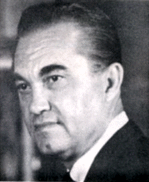There is a lot of blogospheric excitement about New York Mayor Michael Bloomberg becoming an independent.
There is practically an on-air orgasm going on over at MSNBC, which believes he has completely scrambled the 2008 Presidential race and given hope to the Republicans.
The truth is the opposite. Bloomberg, if he runs, clarifies the race. And he guarantees victory to the Democratic nominee.
That’s because, as regular readers of this blog will recall, Bloomberg is George Wallace. He is in revolt against the social policies of the dominant party, just as Wallace was in revolt against the Democrats’ embrace of civil rights. And his Vice Presidential running mate, presumably conservative Republican Chuck Hagel, is (outside of Iraq) very much in tune with the party’s social base, just as Wallace’s sidekick, former General Curtis LeMay, was a big-time Cold Warrior. (Those who have seen Robert McNamara’s The Fog of War will know that LeMay’s memory was practically a co-star.)
There is only one group of Democrats who might be tempted at all by a Bloomberg candidacy, and these are the fans of Joe Lieberman, a rapidly-dwindling band indeed. Such corporatist, Cold War Democrats would have been a target of choice for any Republican anyway — losing them to an independent instead is actually an advantage.
And, no, Bloomberg can’t be elected. The best independent run ever was that of Theodore Roosevelt. He finished second. Ross Perot’s 19% of the 1992 vote is the second-best independent result. But it was Wallace’s 1968 result which had the most lasting impact.
The heart of Wallace Country was regional, but his real appeal was
psychographic. He pulled union workers, minor bureaucrats and small
business owners, who had previously been reliable Democrats, away from
the party. Permanently. It only remained then for Republicans to target
those groups in order to gain a generation of political dominance.
Bloomberg is doing the same thing. His appeal is to business groups and
libertarians, both of which are in open revolt against the Religious
Right, but neither of which is yet comfortable with the idea of voting
Democratic. Just as Wallace voters of a generation ago feared the jump
straight to Nixon, thinking all the time of Herbert Hoover, so
Bloomberg voters today fear the jump straight to Hillary Clinton,
fearing George McGovern.
Clinton can get them to make that jump, easily, once she’s in power.
She will feed red meat rhetoric to her base, just as Nixon did, while
in fact governing in a conservative manner, just as Nixon in fact
governed as a liberal while feeding his base rhetoric.
If Clinton chooses, say, John Edwards as her running mate, he might
consider it good news, and some might consider it some bad news.
Personally I’ll consider it Agnews.













